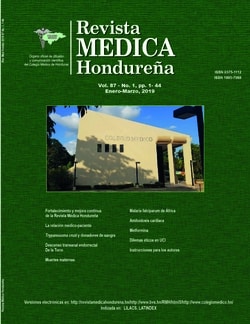School child with Plasmodium falciparum malaria from Africa: public health risk in Honduras
DOI:
https://doi.org/10.5377/rmh.v87i1.11930Keywords:
Antimalarials, Chloroquine, Malaria, falciparum, Plasmodium falciparumAbstract
Background: Travels to endemic zones with resistant parasites, evolutionary response of Plasmodium and weakened health systems, compromise malaria global and local control. Case Description: Boy, 6 year old, treated at University Hospital (HE), Tegucigalpa, referred from Siguatepeque, Comayagua, due to doubtful laboratory diagnosis and history of living in Africa and four P. falciparum malaria episodes (2015-2017). On admission, he presented gastrointestinal manifestations and a report of Plasmodium spp. Treatment started with chloroquine, which was omitted and replaced the next day by an artemisinin derivative when confirming P. falciparum and 0.7% parasitized erythrocytes. He demonstrated good clinical and parasitological response; was discharged at 7th hospitalization day after 72 hours without fever. Thick smear at discharge reported P. falciparum sexual stages, indicating oral primaquina which was started when available seven days later. At the 5th day after discharge, ambulatory control showed no parasites although persisting phagocytized malarial pigment in leukocytes was observed. Four family members that lived also in Africa were examined. The father, who reported mild headache and low fever, had asexual stages of P. falciparum; presented good response to treatment with artemisinin derivative. Conclusions: Description of the case and the different links in its clinical and epidemiologic approach, reflect the potential for malaria complication. The introduction of chloroquine resistant parasites constitutes a public health threat, mainly due to avoidable failures in the health system. It is necessary to strengthen the early diagnosis and timely treatment, especially in the context of malaria elimination in Mesoamerica.
Downloads
595




